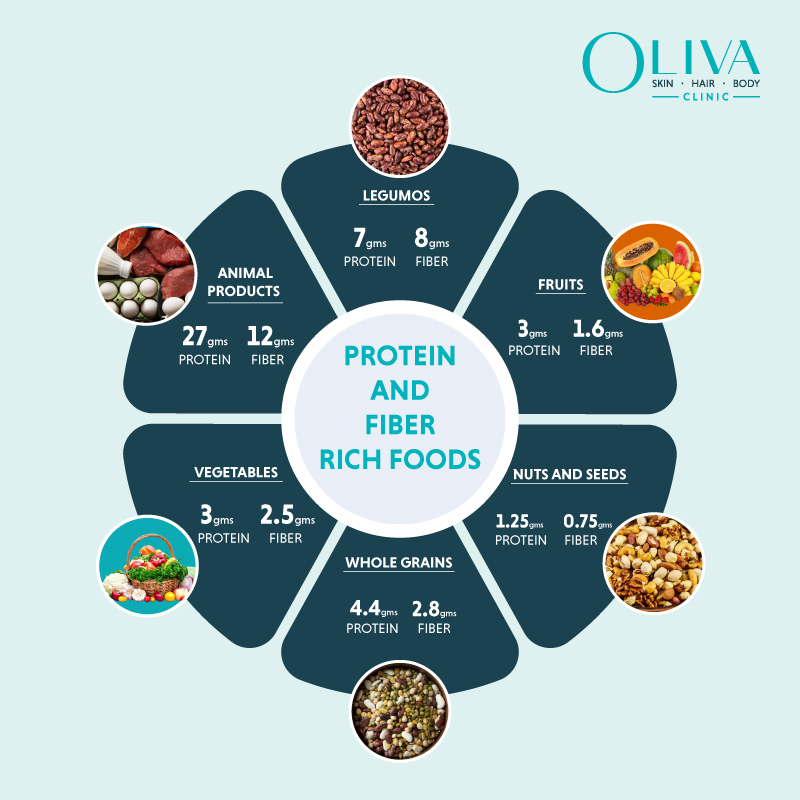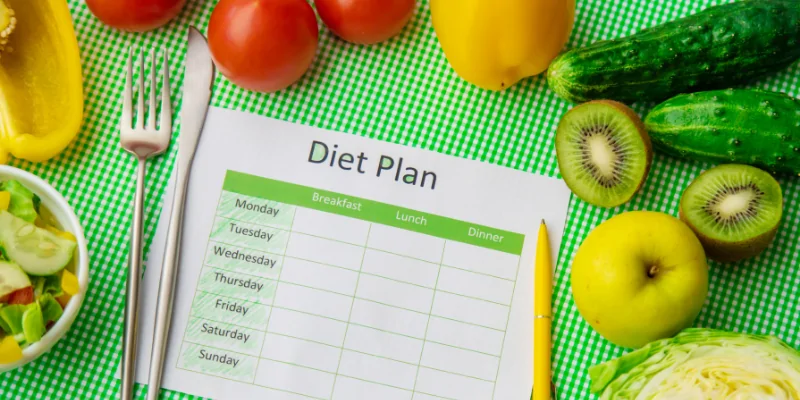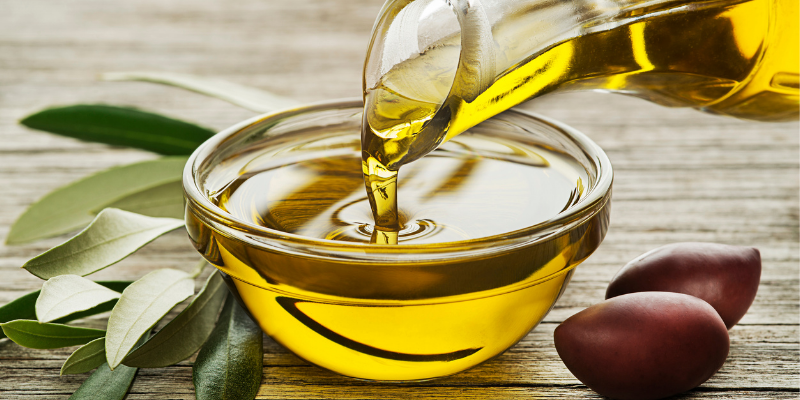Best Protein and Fiber-Rich Foods for Healthy Diet You Must Try
Have you ever wondered why protein and fibre are considered essential components of a healthy diet? Protein and fibre-rich foods are more than just trendy buzzwords they are vital for maintaining your overall health and well-being. High-protein fibre foods can help you feel fuller for longer. They also support digestion and help build strong muscles.
This article explores the benefits of high-protein fibre foods, helps you discover the top protein and fibre-rich foods and understand how to include protein and fibre in your everyday meals.
In This Article

What Are Protein And Fibre?
Proteins are vital nutrients the body uses to build muscles, send nerve signals, and grow hair. They provide energy that is crucial in human evolution and neurological development. A protein-rich diet is essential for children, pregnant women, and those recovering from injuries. Humans need ten essential amino acids.
Fibre is a type of carbohydrate that promotes digestive health rather than energy. A fibre-rich diet reduces colon cancer risk and regulates bowel movements. Fibre also slows digestion, preventing insulin spikes.
There are two main types of fibre :
Soluble and insoluble. While soluble fibre dissolves in water and lowers cholesterol, insoluble fibre adds bulk to stool and aids digestion. Foods high in protein and fibre are excellent for a balanced diet. Some of the best protein and fibre foods include meat, dairy, eggs, whole grains, soy, and legumes. In addition, soluble fibre is found in oats, beans, apples, and citrus fruits. Insoluble fibre is found in whole grains, nuts, and vegetables.
Importance of Protein and Fibre in Diet
High protein fibre foods are critical components of a balanced and healthy diet. Notably, even though fibre is not digestible by the body, it is still super beneficial. People who consume the recommended amount of dietary fibre have a low risk of stroke, bowel cancer, type 2 diabetes and heart ailments.
Foods rich in fibre also lend satiety and keep one from binging and giving in to hunger pangs. Fibre also aids digestion and helps maintain easy bowel movements, keeping constipation at bay. [1]
Similarly, protein, a macronutrient, is essential for the growth, repair, and maintenance of your body tissues. It plays a vital role in the development of your bones and muscles. Your hair, skin and nails, too, have protein in their building blocks. Hence, proteins, complete with the nine essential amino acids, are vital components you derive from the food you eat. [2]
Benefits of Protein and Fibre-Rich Foods
Foods high in protein and fibre are a must-have in your daily diet. Here are some of the top benefits of high-protein fibre foods
-
Muscle Growth and Repair:
Protein plays a key role in building and repairing muscles, so it is essential for athletes and those who exercise regularly. Amino acids found in protein act as the building blocks for muscle tissue.[3] Therefore, consuming protein-rich foods can help improve muscle strength and promote recovery after workouts. It also helps maintain muscle mass, especially as you age.
-
Satiety and Weight Management:
Protein and fibre are known for keeping you feeling full for longer.[4] This satiety helps reduce hunger and prevents overeating. It also helps you manage your weight with ease. Therefore, a diet high in these nutrients can support healthy weight loss by decreasing calorie intake and controlling appetite, leading to better weight management over time
-
Bone Health
Protein is essential for maintaining strong and healthy bones.[5] It supports bone density and helps prevent bone loss as we age. Therefore, incorporating protein-rich foods like dairy, nuts, and legumes into your diet can improve bone health, reducing the risk of fractures and conditions such as osteoporosis.
-
Metabolic Boost
Consuming foods high in protein and fibre can boost your metabolism because your body uses more energy to digest proteins than carbohydrates or fats. This increased energy expenditure helps burn more calories, even when you’re at rest.[6] As a result, including protein-rich foods in your diet can aid in weight management and enhance your body’s metabolic rate, making weight loss easier.
-
Heart Health
Fibre is excellent for heart health because it helps lower cholesterol levels. Soluble fibre, in particular, can reduce “bad” LDL cholesterol, decreasing the risk of heart disease.[7] That is why including fibre-rich foods like oats, beans, and fruits in your diet can promote heart health and reduce the risk of cardiovascular issues.
-
Immune Function and Hormone Regulation
Protein is vital for producing hormones and supporting the immune system. Amino acids from protein help create enzymes and hormones that regulate body functions[8]. Therefore, consuming enough protein can ensure your immune system functions properly, helping your body fight off illnesses and infections. Foods like lean meats, fish, and legumes are excellent for maintaining these vital processes.
-
Blood Sugar Control
Fibre plays a crucial role in controlling blood sugar levels. As a result, sugar absorption in the bloodstream slows down and prevents sudden spikes or crashes in blood sugar levels. This works more for people with diabetes[9]. Therefore, incorporating high-fibre foods like whole grains and vegetables into your diet can support stable blood sugar levels and improve overall health.
-
Reduced Risk of Chronic Diseases
A diet that contains ample foods high in protein and fibre can lower the risk of developing chronic diseases such as Type 2 diabetes or cancer[10]. Fibre helps regulate your body functions, while protein supports muscle maintenance and immune health. Therefore, regularly eating protein and fibre-rich foods can contribute to long-term health. It also offers protection against chronic diseases.
-
Digestive Health
Fibre is crucial for the body to maintain a healthy digestive system.[11] It adds bulk to your stool, aiding regular bowel movements and preventing constipation. That is why high-fibre foods like fruits, vegetables, and whole grains are essential in your daily diet.
Top Protein and Fibre Rich Foods:
Given below are some of the best protein and fibre foods you must try to include in your daily diet to ensure good health:
-
Legumes
Legumes such as beans or daily lentils are excellent sources of protein and fibre. Add them to your soups and salads for a healthy intake and a hearty meal. A 100-gram serving of cooked black beans offers about 8 grams of protein and 7 grams of fibre. A similar serving of cooked lentils provides approximately 9 grams of protein and 8 grams of fibre.
-
Whole Grains
Quinoa and oats are versatile whole grains. They offer a nutritious base for breakfast or lunch. A 100-gram serving of cooked quinoa offers about 4.4 grams of proteins and 2.8 grams of fibre.[12] Dry oats contain around 13.2 grams of protein and 10.1 grams of fibre, making them a great choice for a balanced diet.
-
Nuts and Seeds
Nuts and seeds are all nutrient-dense snacks. These include almonds, walnuts, Chia seeds, or sunflower seeds. They make for excellent toppings for yoghurt and salads, as well. For example, a daily serving of 5 almonds provides about 1.25 grams of protein and 0.75 grams of fibre. [13] Similarly, two tablespoons of chia seeds (approximately 28 grams) contain around 4 grams of protein and 10 grams.
-
Vegetables
High-fibre vegetables such as broccoli and avocado add nutrition to any meal. A cup of broccoli offers about 2.5-3 grams of proteins and 2.5 grams of fibre[14], while a medium avocado contains around 3 grams of protein and 7 grams of fibre[15].
-
Fruits
Some fruits are super nourishing and packed with the goodness of vitamins, minerals, proteins and fibre. Apples and berries are such delicious fruits that pack a fibre punch. A medium apple has 2.5-4 grams of fibre[16], while a cup of berries offers around 3 grams. These fruits are excellent for snacking or dessert.
-
Animal Products
Eggs, lean meats like chicken, and dairy products like yoghurt are some of the best animal products for consumption to boost your protein intake. Did you know that 100 grams of chicken provides 27-30 grams of protein? At the same time, a cup of yoghurt contains 10-12 grams of protein, aiding muscle growth and repair[17].
High Fibre, High Protein Salad Recipe
You can use the foods mentioned above to prepare a high-fibre, high-protein salad recipe. This one is easy to incorporate into your daily diet:
Ingredients:
- Quinoa – 1 cup (cooked)
- Cooked lentils – 1 cup
- Broccoli – 1/2 cup (chopped)
- Avocado – 1/2 (diced)
- Almonds – 1/4 cup (chopped)
- Berries – 1/2 cup (your choice of strawberries, blueberries, or raspberries)
- Chia seeds – 2 tablespoons
- Olive oil – 1 tablespoon
- Lemon juice – 1 tablespoon
Instructions:
- Mix cooked quinoa, lentils, broccoli, avocado, and berries in a large bowl.
- Add almonds and chia seeds to it for that extra crunch and nutrition.
- Add a little olive oil and lemon juice to the mix and toss it gently.
- You can now serve it immediately or store it in a refrigerator for use later.
Meal Preparation:
You can prepare the quinoa and lentils in advance and store them in the fridge until you need them. You can store this salad in individual airtight containers in the refrigerator for up to two days. It makes for a quick grab-and-go meal for the week.
Nutritional Benefits:
- This salad comes packed with plant-based protein from quinoa, lentils, and chia seeds. It supports muscle growth and repair.
- It is also rich in fibre and aids digestion.
- High in fibre, this salad helps keep you satiated for long.
- Avocado and almonds bring heart-healthy fats that help reduce bad cholesterol levels.
- The fruits and vegetables in the salad are a good source of vitamins and antioxidants that boost your immunity and overall health.
- This salad makes for a balanced combination of carbohydrates, proteins, fats, and fibre.
How to Include Protein and Fibre into Your Diet?
Here are some simple and easy ways to incorporate foods high in protein and fibre into your daily meals:
-
Breakfast:
Starting your day with a high-protein and high-fibre breakfast is very important. Some good options include yoghurt topped with chia seeds and berries or oatmeal with almond butter and sliced bananas. You can also add eggs with spinach and whole-grain toast.
-
Lunch:
This must be a wholesome meal, with salads loaded with beans, quinoa, and lean meats. You can also go for roti with a bowl of daal or gravy chicken and plenty of veggies. Yoghurt or buttermilk are great accompaniments.
-
Dinner:
Focus on lean proteins for this meal. Grilled chicken, fish or paneer, along with some roasted vegetables, brown rice or quinoa, work well. A vegetable stir-fry with tofu and whole wheat chapatis or noodles is also a great option.
-
Snacks:
Choose snacks like nuts, seeds, or fruit with a dollop of Greek yoghurt. Whole-grain crackers with hummus and peanut butter work well. You can also try grilled paneer with apple slices for a filling snack.
Protein and Fibre Foods Vs. Low Calorie Foods
Here is a comparison of protein and fibre-rich foods Vs. Low-calorie foods to help you understand their importance in your diet:
Criteria |
Protein and Fibre-Rich Foods |
Low-Calorie Foods |
| Primary Nutrients | These foods are rich in proteins and dietary fibre (soluble and insoluble). | These foods are low in calories and may contain essential vitamins and minerals. |
| Benefits | This food is satiating and aids muscle growth, digestion, and heart health. It helps regulate blood sugar. | This food supports weight management. |
| Role in Diet | These foods build and repair tissues and improve digestion and overall energy levels. | These foods can help maintain a calorie deficit and lose weight without nutrient loss. |
| Satiety Level | Protein offers high satiety, while fibre bulks up to slow down digestion and frequent hunger pangs. | These foods offer moderate to high satiety but much lower than protein and fibre-rich foods. |
| Impact on Blood Sugar | These foods stabilise blood sugar by slowing glucose absorption. This creates sustained energy release. | These foods may cause blood sugar spikes if they contain low-calorie carbohydrates. |
| Energy Density | They offer moderate to high energy density, and one feels full quickly. | They offer low energy density so people can eat more food without high caloric intake. |
| Common Combinations | These foods are best combined with healthy fats and carbohydrates for a balanced meal. | These foods are best paired with other low-calorie ingredients like leafy greens, water-rich vegetables, or lean proteins. |
| Suitable for Weight Management | They are highly suitable as they promote fullness, reduce overall calorie consumption and help preserve your lean muscle mass during weight loss. | They are suitable for weight management as one can eat larger portions without exceeding calorie limits. However, one needs to balance nutrient intake to avoid deficiencies. |
| Overall Health Impact | They positively impact overall health and offer metabolic advantages. | They also positively impact health and support weight loss. However, they may lack some nutrients and the satiation from protein and fibre. |
Final Takeaway
Incorporate protein and fibre-rich foods into your daily diet is vital to maintain a healthy lifestyle. These nutrients support muscle growth, improve digestion, and promote overall well-being. Some of the best protein and fibre foods include whole grains, lean proteins, fruits, and vegetables, which you can enjoy when creating a balanced meal. These keep you satisfied and energised throughout the day.
Frequently Asked Questions
Excessive intake of proteins can strain your kidneys and weaken your bones. At the same time, too much fibre may cause digestive issues like bloating and constipation. A balanced diet is essential.
If you have a protein deficiency, you may experience muscle loss and fatigue. If you have fibre deficiency, you will face digestive issues and high cholesterol. A balanced diet prevents these health problems.
Proteins boost the production of neurotransmitters in your body, elevating mental alertness, while fibre stabilises your blood sugar levels to prevent energy crashes. Together, they enhance focus and well-being.
Protein provides amino acids for muscle growth, and fibre aids digestion and nutrient absorption, supporting muscle development and overall health. High-protein and fibre-rich foods are beneficial.








